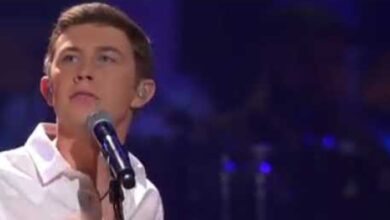“Four Walls” by Jim Reeves: A Song Covered by Artists Worldwide
“Four Walls,” a song steeped in melancholy, was penned in 1951, yet it lay dormant for six years before finding its way into the recording studio. The poignant lyrics, crafted by Marvin J. Moore, alongside George H. Campbell Jr.’s musical composition, weave a tale of unrequited love and longing. The narrative voice in the song mourns a lost love, waiting in vain for her return, with only the four walls as silent witnesses to his endless waiting.
This theme of waiting mirrored the song’s own journey to prominence, seemingly biding its time until the right artist could breathe life into it. That artist proved to be Jim Reeves, who stumbled upon the song in producer Chet Atkins’ office.
Captivated by its depth, Reeves was determined to record it, despite Atkins’ initial hesitation, believing the song better suited to a female voice. Reeves’ persistence paid off, and he entered the studio on February 7, 1957, to lay down his tracks.
In a departure from his usual robust vocal style, Reeves approached “Four Walls” with a tender, mellow delivery, standing closer to the microphone to capture the song’s intimate essence. He was joined by an ensemble of talented musicians: Bob Moore on bass, Chet Atkins on guitar, Farris Coursey on drums, Floyd Cramer on the piano, and The Jordanaires providing vocal backing. Their collective effort propelled “Four Walls” to the forefront of the country music scene in 1957, also earning it a respectable position at No. 12 on the pop charts.
The song’s resonance with listeners sparked a wave of covers by a diverse array of artists, cementing its place in the country music canon. In the wake of its release, Jim Lowe and Michael Holiday each offered their renditions in 1957, with Lowe’s version climbing to No. 15 on the Billboard charts. The song’s adaptability was further demonstrated through covers by Kay Starr and Patti Page in the early ’60s, Bing Crosby in 1965, and Connie Francis in 1967, among others.
The late ’60s saw interpretations by B.J. Thomas and Jerry Lee Lewis, followed by Vera Lynn’s version in 1977, adding a British touch to the American classic.
The tribute to “Four Walls” and its original artist continued into the ’80s with Ronnie Milsap’s cover, featured on a Jim Reeves tribute album that spotlighted ten of Reeves’ hit songs.
The legacy of “Four Walls” was further solidified in 1995 when Willie Nelson included his rendition on his album “Just One Love,” proving the song’s enduring appeal and timeless nature.





